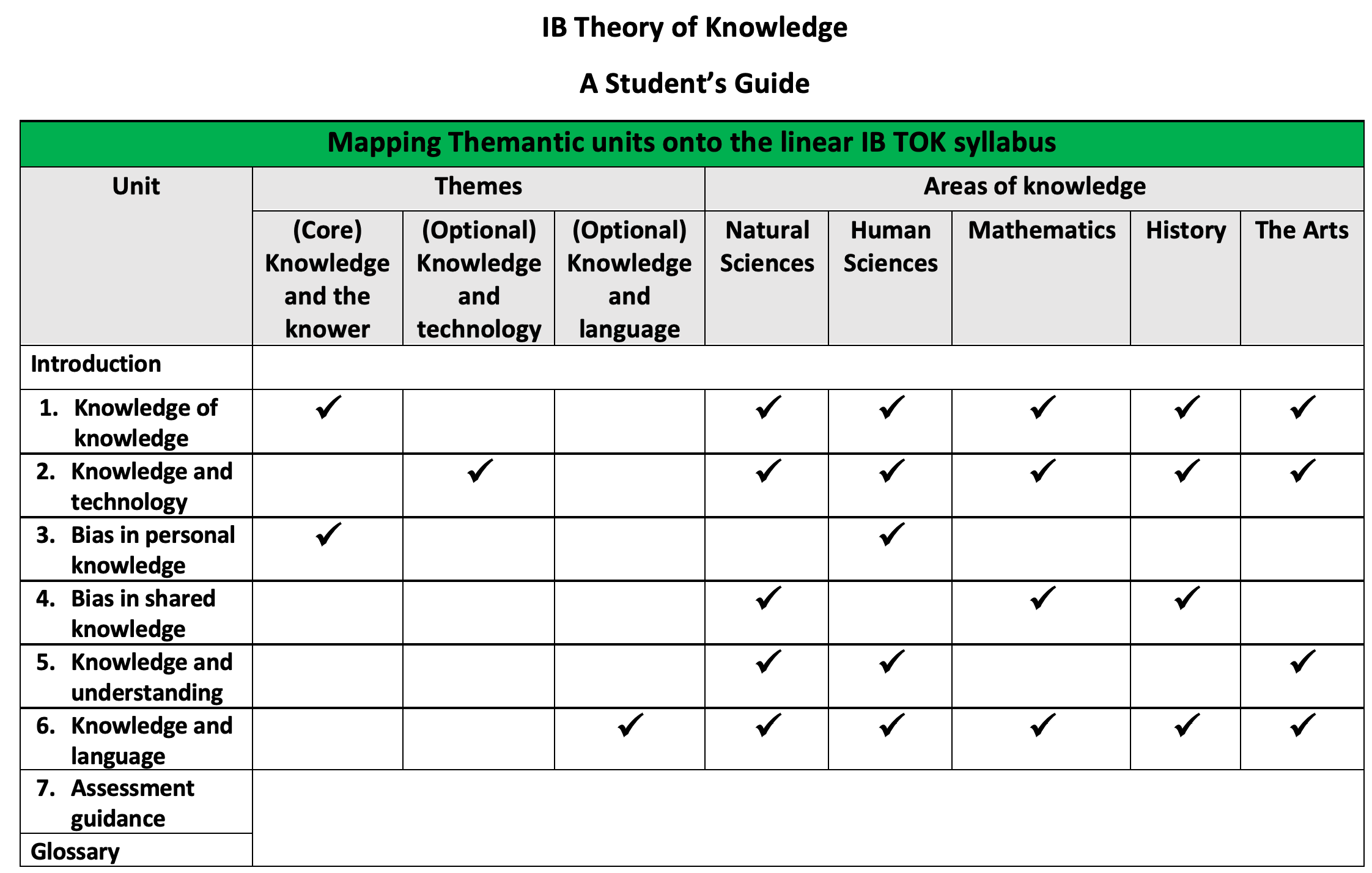IB TOK - Teacher Support Pack - Unit 4: Bias in Shared Knowledge
- Category: IB Theory of Knowledge, Support Packs
This Teacher Support Pack is designed to assist you in the teaching of Unit 4, Bias in shared knowledge. It includes 22 lessons. The focus in this unit is on three areas of knowledge: Natural Sciences, History and Mathematics. They are all investigated in comparison and through the overarching concept of bias.
Contents:
Unit 4. Bias in shared knowledge
Lesson 1: Naive theories
4.1. Bias in Natural Sciences
Lesson 2: Demarcation problem
Lesson 3: Falsifiability
Lesson 4: Scientific progress
Lesson 5: Underdetermination of scientific theories
Lesson 6: Theory-laden facts
Lesson 7: Verisimilitude
Lesson 8: Paradigm shifts
Lesson 9: Incommensurability
4.2. Bias in History
Lesson 10: Historical interpretation
Lesson 11: Historical perspectives
Lesson 12: Historical objectivity and historical facts
Lesson 13: Historical objectivity and rival interpretations
Lesson 14: Historical objectivity and ethics
Lesson 15: Heteroglossia
Lesson 16: Multiperspectivity
4.3. Bias in Mathematics
Lesson 17: Proof
Lesson 18: Axiomatic systems
Lesson 19: Discovered or invented? Truth in mathematics
Lesson 20: Consistency
Lesson 21: Mathematical realism
Lesson 22: Overview: bias in Mathematics, Natural Sciences and History
Refer to this table for a general overview of how Themantic chapters map onto linear TOK units:

Features:
- Unit plan and lesson plans
- A student workbook where they take notes, write answers and do activities
- The teacher’s version of the same workbook, with suggested answers and teaching tips included
- PowerPoint presentations
- Activity resources (such as quizzes, handouts, in-class experiments)
- 100 % ready made materials required for each lesson.
- Purely discussion-based activities (such as debates, discussions with a verdict, mingling activities, court role-plays) as well as more structured activities (such as jigsaw reading, unscrambling tasks, gallery walks)
- Activities designed for different levels of learning: basic understanding of key concepts (such as revision quizzes, guessing games, sorting tasks) and higher-level skills of formulating arguments and connecting ideas (such as formulating implications, designing mind-maps, criticizing examples, debates)
- Activities designed to develop skills necessary for final assessment (TOK essay and TOK exhibition)
- Activities designed to explore students’ creative side, such as a thought experiment or creating a job resume on behalf of mathematics.
Don’t forget to read about our textbook and see the full range of currently available resources in our store.
Don’t forget to download the free preview of our textbook.
Prepared by an experienced TOK teacher, IB author, examiner and workshop leader, Alexey Popov.
Author: Alexei Popov
Delivery: Download Link sent by Email
Format: Digital
License: Teacher*
*A teacher license allows you to share this with students enrolled in your school. It can be made available through internal digital mediums (e.g. email, Managebac, moodles or wikis) but cannot be published on publicly available sites. This license is for one teacher. If one organization has multiple teachers, one license per teacher must be purchased.
Contents:
Unit 4. Bias in shared knowledge
Lesson 1: Naive theories
4.1. Bias in Natural Sciences
Lesson 2: Demarcation problem
Lesson 3: Falsifiability
Lesson 4: Scientific progress
Lesson 5: Underdetermination of scientific theories
Lesson 6: Theory-laden facts
Lesson 7: Verisimilitude
Lesson 8: Paradigm shifts
Lesson 9: Incommensurability
4.2. Bias in History
Lesson 10: Historical interpretation
Lesson 11: Historical perspectives
Lesson 12: Historical objectivity and historical facts
Lesson 13: Historical objectivity and rival interpretations
Lesson 14: Historical objectivity and ethics
Lesson 15: Heteroglossia
Lesson 16: Multiperspectivity
4.3. Bias in Mathematics
Lesson 17: Proof
Lesson 18: Axiomatic systems
Lesson 19: Discovered or invented? Truth in mathematics
Lesson 20: Consistency
Lesson 21: Mathematical realism
Lesson 22: Overview: bias in Mathematics, Natural Sciences and History
Refer to this table for a general overview of how Themantic chapters map onto linear TOK units:

Features:
- Unit plan and lesson plans
- A student workbook where they take notes, write answers and do activities
- The teacher’s version of the same workbook, with suggested answers and teaching tips included
- PowerPoint presentations
- Activity resources (such as quizzes, handouts, in-class experiments)
- 100 % ready made materials required for each lesson.
- Purely discussion-based activities (such as debates, discussions with a verdict, mingling activities, court role-plays) as well as more structured activities (such as jigsaw reading, unscrambling tasks, gallery walks)
- Activities designed for different levels of learning: basic understanding of key concepts (such as revision quizzes, guessing games, sorting tasks) and higher-level skills of formulating arguments and connecting ideas (such as formulating implications, designing mind-maps, criticizing examples, debates)
- Activities designed to develop skills necessary for final assessment (TOK essay and TOK exhibition)
- Activities designed to explore students’ creative side, such as a thought experiment or creating a job resume on behalf of mathematics.
Don’t forget to read about our textbook and see the full range of currently available resources in our store.
Don’t forget to download the free preview of our textbook.
Prepared by an experienced TOK teacher, IB author, examiner and workshop leader, Alexey Popov.
Author: Alexei Popov
Delivery: Download Link sent by Email
Format: Digital
License: Teacher*
*A teacher license allows you to share this with students enrolled in your school. It can be made available through internal digital mediums (e.g. email, Managebac, moodles or wikis) but cannot be published on publicly available sites. This license is for one teacher. If one organization has multiple teachers, one license per teacher must be purchased.




















